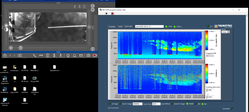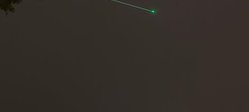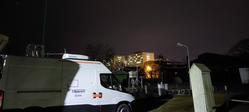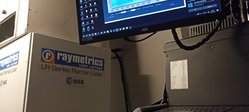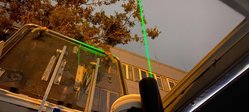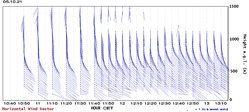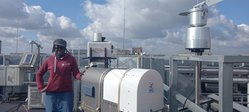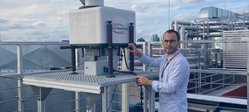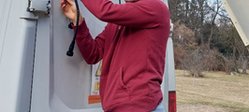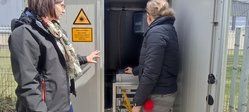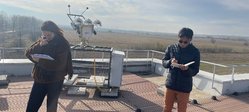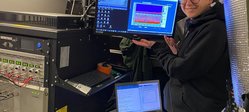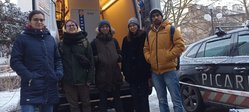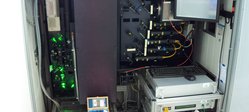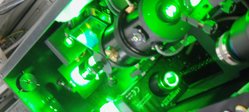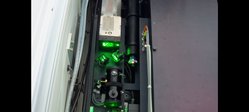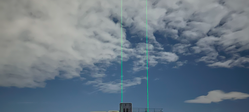Laboratorium Pomiarów Zdalnych
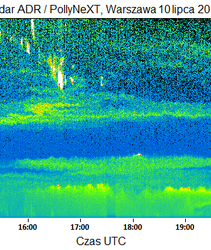
Laboratorium Pomiarów Zdalnych
| Kierownik laboratorium: | dr hab. Iwona S. Stachlewska |
| Opiekun techniczny: | dr inż. Wojciech Kumala |
| Programy: | ATMO-ACCESS Trans-National-Access |
| Lokalizacja: | ul. Pasteura 5 |
| Instytut: | IGF |
| Zakład: | ZFA |
The Remote Sensing Laboratory (RS-Lab) was created in 2013 to perform remote quasi-continuous measurements of optical and microphysical properties of atmospheric aerosols and clouds. The main goal to conduct such measurements at the Warsaw RS-Lab site is to assess the aerosol properties in the troposphere and lower stratosphere over this urban site. With time RS-Lab instrumentation started to support measurements at several different sites and to collaborate with several national and international institutions and private companies, this including the instrumentation exchange.
The RS-Lab has been equipped with different active and passive remote sensing instruments, among others: the stationary aerosol polarization Raman lidar (PollyNeXT since 2013), the near-range aerosol Raman lidar (NARLa since 2015), the mobile aerosol polarization Raman EMORAL lidar (Raymetrics/ESA since 2018), the Doppler wind lidar (HALO since 2021), the shadowband radiometer (MFR-7 since 2010), the microwave radiometer (HATPRO-G2/INOE since 2019), the sun-photometer (CIMEL/INOE since 2018), the hand-held sunphotometer (MICROTOPS since 2018), and the cloud radar (BASTA/LATMOS 2018-2020).
The stationary aerosol lidars are located on the ground in close vicinity of the Faculty of Physics building, on the measurement platform on the roof of the building (photometer, radiometers, wind lidar), and in the research-van where one of the lidars and hand-held sunphotometers are permanently installed.
Some of the listed above instruments (EMORAL, BASTA, MFR-7) were temporarily installed at the PolWET station of the Poznan University of Life Sciences at peatland in Rzecin, Poland for long term POLIMOS campaigns (with intensive operation period during March-October 2018 and June-September 2019). During the first POLIMOS-2018 campaign, aerosol Eddy-covariance (Uni Granada) and Doppler wind lidar measurements (Uni Granada) were additionally conducted in Rzecin. During the second POLIMOS-2019 campaign, the microwave radiometer (INOE) joined the peatland site instead.
Currently, several instruments are under public procurement procedures: the cloud radar (for installation at Rzecin and Warsaw sites), the stationary lidar (for temporary installation at SolarAOT Strzyżów site and final installation at Polish ACTRIS/ICOS site), the solar/lunar photometer (for installation and Vilnius FTMC site and Warsaw RS-Lab site), and for installation at Warsaw RS-Lab site the supporting instruments: the AE-33 aethalometer and the polar nephelometer.
During the summer of 2018 and 2019, two 7-days lidar international intercomparison campaigns were conducted, during which the EMORAL, the PollyNeXT and the NARLa lidars were assessed for performance and data product quality against the EARLINET-ACTRIS reference lidars: POLIS (LMU) and RALi (INOE).
Research carried out at RS-Lab is financed primarily from the POLIMOS, SAMIRA and MULTIPLY projects of the European Space Agency and the European Commission H2020 grants: ACTRIS-PPP, ACTRIS-IMP, ATMO-ACCESS, and RI-URBANS. We have been also realizing several national grants of NCN (2 Preludium, 1 PRELIDIUM-BIS, DAINA (with FTMC in Lithuania). The RS-Lab operation is recognized as a strategical one of the Institute, being therefore strongly supported within the internal funding and administrative support at the Faculty of Physics and the University of Warsaw level.
The research is carried out in close cooperation with many research institutions TROPOS (Germany), INOE (Romania), NOA (Greece), University of Granada (Spain), LMU-MIM (Germany), LATMOS (France), University of Potsdam (Germany), AWI (Germany), FTMC (Lithuania), LOA (France), AGH (Poland), PULS (Poland), UŚ (Poland), as well as companies: Raymetrics S.A. (Greece), Licel GmbH (Germany), InnoLas (Germany). The collaboration terms are realized by joint instrument developments (e.g. TROPOS, Raymetrics, Licel), instrument loans (e.g. INOE, LATMOS, Uni Granada), collaboration on new data retrieval schemes and synergetic products (e.g. Uni Granada, NOA, AWI). The RS-Lab acts as a support partner in the development of the Polish ACTRIS Mobile Exploratory Platform comprising a combo of research vehicles and a hot-air balloon of the UKLA-UŚ (Poland). The RS-Lab is foreseen as one of the National Facility ACTRIS Observational Platforms, being also an official pilot site for the labelling process for ACTRIS Aerosol RS; the second component under development is ACTRIS Cloud RS.
The measurements carried out at the RS-Lab are used for scientific research conducted within the EARLINET, AERONET-NASA, PollyNET, and PolandAOD-NET networks. Currently, we are establishing our way towards the CLOUDNET network. Therefore the merit support of the colleagues running the networks and ACTRIS CARS/ARS and, as well as the merit and financial support provided within the frame of the EU funded H2020 projects is crucial for the long-term high-quality observation aspect of our work.
Contributors to RS-Lab:
Iwona S. Stachlewska (lead), Post Docs: Lucja Janicka, Dominika Szczepanik, Olga Zawadzka-Mańko, Pablo Ortiz-Amezcua, Dongxiang Wang, Christiana Olusegun, Ph.D. students at UW: Emeka Ugboma, Artur Tomczak, Afwan Hafiz, Maciej Karasewicz, and PhD students at PULS: Patryk Poczta, Kamila Harenda, M.Sc. students: Zuzanna Rykowska, technical support: Wojciech Kumala, Rafał Fortuna.
Research visitors: Alex Louridas (Raymetrics, Greece), Konstantina Nakoudi (AWI, Germany), Anca Nemuc (INOE, Romania), Julija Pauraite-Dudek (FTMC, Lithuania), Xiaoquan Song (OUC, China), Eleni Tetoni (NOA, Greece / DLR, Germany), Horatiu Stefanie (Uni Babeş-Bolyai, Romania), Rayonil Carneiro (NISR, Brazil), Christine Böckmann (UPP / AWI, Germany), Camilla Kassar (Uni Campina Grande, Brazil), Jesus Abril-Gago (Uni Granada).
Former colleagues: Michał Piądłowski, Paweł Swaczyna, Szymon Migacz, Artur Szkop, Paulina Sokół, Anna Górska, Anna Zielinska-Szkop, Montserrat Costa-Surós, Katarzyna Misiura, Aleksandra Lewczuk, Karolina Borek, Fatima Mirza-Montoro.
Powiązane dokumenty:
- Karasewicz, Maciej; Wacławczyk, Marta; Ortiz-Amezca, Pablo; Stachlewska, Iwona Sylwia, 2024, Turbulence properties for June-September period at rural and urban environment, RepOD ICM UW, vol. V1, doi.org/10.18150/LSLM10
- Janicka L., Davuliene L., Bycenkiene S. and Stachlewska I., 2023, Long term observations of biomass burning aerosol over Warsaw by means of multiwavelength lidar, Optics Express, vol. 31(20), 33150-33174, 10.1364/OE.496794
- Minderytė A., Ugboma E.A., Mirza Montoro F.F., Stachlewska I.S., Byčenkienė S., 2023, Impact of long-range transport on black carbon source contribution and optical aerosol properties in two urban environments, Heliyon, vol. 9(9), art. 19652, 10.1016/j.heliyon.2023.e19652
- Szczepanik D.M., Poczta P., Talianu C., Böckmann C., Ritter C., Stefanie H., Toanca F., Chojnicki B.H., Schüttemeyer D., Stachlewska I.S., 2023, Spatio-temporal evolution of long-range transported mineral desert dust properties over rural and urban sites in Central Europe, Science of The Total Environment, vol. 903, art. 166173, 10.1016/j.scitotenv.2023.166173
- Ugboma E.A., Stachlewska I.S., Schneider P. and Stebel K., 2023, Satellite observations showed a negligible reduction in NO2 pollution due to COVID-19 lockdown over Poland, Frontiers in Environmental Science, vol. 11, art. 1172753, 10.3389/fenvs.2023.1172753
- Szczepanik D.M., W. Kumala, C.F. Olusegun, E. Tetoni, V. Amiridis, D. Nicolae, D. Althausen, I.S. Stachlewska, 2023, Long-Term Changes of Optical Properties of Mineral Dust and Its Mixtures Derived from Raman Polarization Water Vapor Lidar in Central Europe., ILRC 2022: Proceedings of the 30th International Laser Radar Conference, 347-353, 10.1007/978-3-031-37818-8_46
- Floutsi A.A., Baars H., Engelmann R., Althausen D., Ansmann A., Bohlmann S., Heese B., Hofer J., Kanitz T., Haarig M., Ohneiser K., Radenz M., Seifert P., Skupin A., Yin Z., Abdullaev S.F., Komppula M., Filioglou M., Giannakaki E., Stachlewska I.S., Janicka L., Bortoli D., Marinou E., Amiridis V., Gialitaki A., Mamouri R.-E., Barja B. and Wandinger U., 2023, DeLiAn – a growing collection of depolarization ratio, lidar ratio and Ångström exponent for different aerosol types and mixtures from ground-based lidar observations, Atmospheric Measurement Techniques, vol. 16(9), 2353–2379, 10.5194/amt-16-2353-2023
- Szczepanik D.M., Ortiz-Amezcua P., Heese B., D’Amico G. and Stachlewska I.S., 2022, First Ever Observations of Mineral Dust in Wintertime over Warsaw, Poland, Remote Sensing, vol. 14(15), art. 3788, 10.3390/rs14153788
- Harenda K.M., Markowicz K.M., Poczta P., Stachlewska I.S., Bojanowski J.S., Czernecki B., McArthur A., Schütemeyer D., Chojnicki B.H., 2022, Estimation of the effects of aerosol optical properties on peatland production in Rzecin, Poland, Agricultural and Forest Meteorology, vol. 316, art. 108861, 10.1016/j.agrformet.2022.108861
- Ortiz-Amezcua P., Andújar-Maqueda J., Manninen A.J., Pentikäinen P., O'Connor E.J., Stachlewska I.S., de Arruda Moreira G., Benavent-Oltra J.A., Casquero-Vera J.A., Poczta P., Wang D., Harenda K.M., Chojnicki B.H., Szczepanik D.M., Janicka Ł., Schüttemeyer D., Alados-Arboledas L., Guerrero-Rascado J, 2022, Dynamics of the Atmospheric Boundary Layer over two middle-latitude rural sites with Doppler lidar, Atmospheric Research, vol. 280, art. 106434, 10.1016/j.atmosres.2022.106434
- Shang X., Baars H., Stachlewska I.S., Mattis I. and Komppula M., 2022, Pollen observations at four EARLINET stations during the ACTRIS-COVID-19 campaign, Atmospheric Chemistry and Physics, vol. 22(6), 3931-3944, 10.5194/acp-22-3931-2022
- Harenda K.M., Markowicz K.M., Poczta P., Stachlewska I.S., Bojanowski J.S., Czernecki B., McArthur A., Schütemeyer D., Chojnicki B.H., 2022, Estimation of the effects of aerosol optical properties on peatland production in Rzecin, Poland, Agricultural and Forest Meteorology, vol. 316, art. 108861, 10.1016/j.agrformet.2022.108861
- Adam M., Fragkos K., Binietoglou I., Wang D., Stachlewska I.S., Belegante L., Nicolae V., 2022, Towards Early Detection of Tropospheric Aerosol Layers Using Monitoring with Ceilometer, Photometer, and Air Mass Trajectories, Remote Sensing, vol. 14(5), art. 1217, 10.3390/rs14051217
- Nakoudi, K., Stachlewska, I. S. and Ritter, C., 2021, An extended lidar-based cirrus cloud retrieval scheme: first application over an Arctic site, Optics Express, vol. 29(6), 8553-8580, 10.1364/OE.414770
- Harenda K.M., Samson M., Juszczak R., Markowicz K.M., Stachlewska I.S., Kleniewska M., MacArthur A., Schüttemeyer D. and Chojnicki B.H., 2021, Impact of Atmospheric Optical Properties on Net Ecosystem Productivity of Peatland in Poland, Remote Sensing, vol. 13(11), art. 2124, 10.3390/rs13112124
- Stebel K., Stachlewska I.S., Nemuc A., Horálek J., Schneider P., Ajtai N., Diamandi A., Benešová N., Boldeanu M., Botezan C., Marková J., Dumitrache R., Iriza-Burca A., Juras R., Nicolae D., Nicolae V., Novotný P., Stefanie H., Vanek L., Vlcek O., Zawadzka-Manko O. and Zehner C., 2021, SAMIRA-SAtellite Based Monitoring Initiative for Regional Air Quality, Remote Sensing, vol. 13(11), art. 2219, 10.3390/rs13112219
- Ajtai N., Mereuta A., Stefanie H., Radovici A., Botezan C., Zawadzka-Manko O., Stachlewska I.S., Stebel K., and Zehner C., 2021, SEVIRI Aerosol Optical Depth Validation Using AERONET and Intercomparison with MODIS in Central and Eastern Europe, Remote Sensing, vol. 13(5), art. 844, 10.3390/rs13050844
- Wang D., Stachlewska I.S., Song X., Heese B., Nemuc A., 2020, Variability of the Boundary Layer Over an Urban Continental Site Based on 10 Years of Active Remote Sensing Observations in Warsaw, Remote Sensing, vol. 12(2), art. 340, 10.3390/rs12020340
- Adam M., Nicolae D., Stachlewska I.S., Papayannis A., and Balis D., 2020, Biomass burning events measured by lidars in EARLINET – Part 1: Data analysis methodology, Atmospheric Chemistry and Physics, vol. 20, 13905–13927, 10.5194/acp-20-13905-2020
- Wang D., Stachlewska I.S., Delanoë J., Ene D., Song X., and Schüttemeyer D., 2020, Spatio-temporal discrimination of molecular, aerosol and cloud scattering and polarization using a combination of a Raman lidar, Doppler cloud radar and microwave radiometer, Optics Express, vol. 28(14), 20117-20134, 10.1364/OE.393625
- Nicolae, D. and 74 authors a.o. Stachlewska, I.S., Szczepanik D., Wang, D., Fortuna, R., 2020, EARLINET/ACTRIS analysis of aerosol profiles during the COVID-19 lock-down and relaxation period. A preliminary study on aerosol properties in the low and high troposphere., EARLINET Internal Reports
- Zawadzka-Mańko O., Stachlewska I., Markowicz K., 2020, Near-Real-Time Application of SEVIRI Aerosol Optical Depth Algorithm, Remote Sensing, vol. 12(9), art. 1481, 10.3390/rs12091481
- Wang D., Szczepanik D. and Stachlewska I.S., 2019, Interrelations between surface, boundary layer, and columnar aerosol properties derived in summer and early autumn over a continental urban site in Warsaw, Poland, Atmospheric Chemistry and Physics, vol. 19, 13097-13128, 10.5194/acp-19-13097-2019
- Proestakis E., Amiridis V., Marinou E., Binietoglou I., Ansmann A., Wandinger U., … Stachlewska I.S., ... and Pappalardo G., 2019, EARLINET evaluation of the CATS Level 2 aerosol backscatter coefficient product, Atmospheric Chemistry and Physics, vol. 19, 11743–11764, 10.5194/acp-19-11743-2019
- Baars H., Ansmann A., Ohneiser K., Haarig M., Engelmann R., Althausen D., Hanssen I., Gausa M., Pietruczuk A., Szkop A., Stachlewska I.S., Wang D., Reichardt J., Skupin A., Mattis I., Trickl T., Vogelmann H., Navas-Guzmán F., Haefele A., Acheson K., Ruth A.A., Tatarov B., Müller D., Hu Q, and more, 2019, The unprecedented 2017–2018 stratospheric smoke event: decay phase and aerosol properties observed with the EARLINET, Atmospheric Chemistry and Physics, vol. 19, 15183-15198, 10.5194/acp-19-15183-2019
- Stachlewska, I.S.; Samson, M.; Zawadzka, O.; Harenda, K.M.; Janicka, L.; Poczta, P.; Szczepanik, D.; Heese, B.; Wang, D.; Borek, K.; Tetoni, E.; Proestakis, E.; Siomos, N.; Nemuc, A.; Chojnicki, B.H.; Markowicz, K.M.; Pietruczuk, A.; Szkop, A.; Althausen, D.; Stebel, K.; Schuettemeyer, D.; Zehner, C., 2018, Modification of Local Urban Aerosol Properties by Long-Range Transport of Biomass Burning Aerosol, Remote Sensing, vol. 10(3), art. 412, 10.3390/rs10030412
- Stachlewska I.S., Zawadzka O., and Engelmann R., 2017, Effect of Heat Wave Conditions on Aerosol Optical Properties Derived from Satellite and Ground-Based Remote Sensing over Poland, Remote Sensing, vol. 9 (11), art. 1199, 10.3390/rs9111199
- Stachlewska I.S., Costa-Suros M., Althausen D., 2017, Raman lidar water vapor profiling over Warsaw, Poland, Atmospheric Research, vol. 194, 258-267, 10.1016/j.atmosres.2017.05.004
- Ortiz-Amezcua P., Guerrero-Rascado L.L., Granados-Muñoz M.J., Benavent-Oltra J.A., Böckmann Ch., Samaras S., Stachlewska I.S., Janicka L., Baars H., Bohlmann S., Alados-Arboledas L., 2017, Microphysical characterization of long-range transported biomass burning particles from North America at three EARLINET stations, Atmospheric Chemistry and Physics, vol. 17, 5931-5946, 10.5194/acp-17-5931-2017
- Janicka L., Stachlewska I.S., Veselovskii I., Baars H., 2017, Temporal variations in optical and microphysical properties of mineral dust and biomass burning aerosol derived from daytime Raman lidar observations over Warsaw, Poland, Atmospheric Environment, vol. 169, 162-174, 10.1016/j.atmosenv.2017.09.022
- Baars H., Kanitz T., Engelmann R., Althausen D., Heese B., Komppula M., Preißler J., Tesche M., Ansmann A., Wandinger U., Lim J.-H., Young Ahn J., Stachlewska I.S., Amiridis V., Marinou E., et al. (45 authors), 2016, An overview of the first decade of PollyNET: an emerging network of automated Raman-polarization lidars for continuous aerosol profiling, Atmospheric Chemistry and Physics., vol. 16, 5111-5137, 10.5194/acp-16-5111-2016
- Engelmann, R., Kanitz, T., Baars, H., Heese, B., Althausen, D., Skupin, A., Wandinger, U., Komppula, M., Stachlewska, I. S., Amiridis, V., Marinou, E., Mattis, I., Linné, H., Ansmann, A., 2016, The automated multiwavelength Raman polarization and water-vapor lidar PollyXT: the neXT generation, Atmospheric Measurement Techniques, vol. 9, 1767-1784, doi:10.5194/amt-9-1767-2016
- Markowicz K.M., Chilinski M.T., Lisok J., Zawadzka O., Stachlewska I.S., Janicka L., Rozwadowska A., Makuch P., Pakszys P., Zielinski T., Petelski T., Posyniak M., Pietruczuk A., Szkop A., Westphal D.L., 2016, Study of aerosol optical properties during long-range transport of biomass burning from Canada to Central Europe in July 2013, Journal of Aerosol Science, vol. 101, 156–173, 10.1016/j.jaerosci.2016.08.006
- Sokół P., Stachlewska I.S., Ungureanu I., Stefan S., 2014, Evaluation of the Boundary Layer Morning Transition Using the CL-31 Ceilometer Signals, Acta Geophysica, vol. 62 (2), 367-380, 10.2478/s11600-013-0158-5
- Nemuc A., Stachlewska I.S., Vasilescu J., Górska A., Nicolae D., Talianu C., 2014, Optical properties of long-range transported volcanic ash over Romania and Poland during Eyjafjallajökull eruption in 2010, Acta Geophysica, vol. 62 (2), 350-366, 10.2478/s11600-013-0180-7
- Stachlewska I.S., Piądłowski M., Migacz S., Szkop A., Zielińska A.J, Swaczyna P.L., 2012, Ceilometer observations of the boundary layer over Warsaw, Poland, Acta Geophysica, vol. 60 (5), 1386-1412, 10.2478/s11600-012-0054-4
- Markowicz, K.M., Zielinski T., Pietruczuk A., Posyniak M., Zawadzka O., Makuch P., Stachlewska I.S., Jagodnicka A.K., Petelski T., Kumala W., Sobolewski P., Stacewicz T., 2012, Remote sensing measurements of the volcanic ash plume over Poland in April 2010, Atmospheric Environment, vol. 48, 66-75, 10.1016/j.atmosenv.2011.07.015

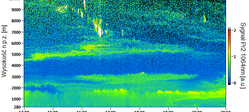 Foto
Foto
